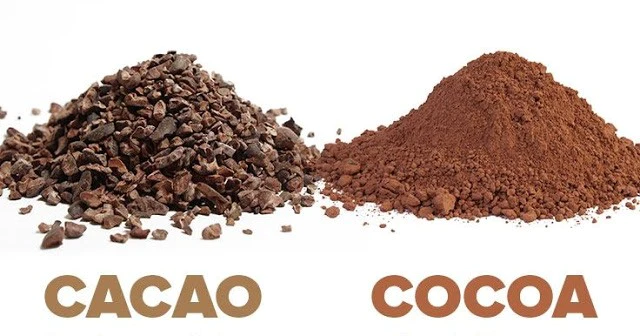Cocoa vs Cacao: the Differences and Benefits
The distinction between cocoa and cacao often eludes many, leading to confusion in the culinary world. In this guide, we’ll decode the cocoa vs cacao debate, shedding light on their unique characteristics, processing methods, and the nutritional benefits they offer.
Understanding Cocoa:
Cocoa is a term commonly associated with processed chocolate products. It refers to the roasted and ground beans that undergo various processing steps to produce cocoa powder and chocolate products. While cocoa may conjure images of indulgent desserts, it’s important to recognize its role in various culinary delights.
Exploring Cacao:
Cacao, on the other hand, is the pure, unadulterated form of the bean before it undergoes extensive processing. In its raw state, cacao maintains its natural richness and nutritional integrity. This term has historical roots, as it was used by ancient civilizations for its revered status as a sacred plant and its potential health benefits.
Processing Differences:
One of the key differentiators between cocoa and cacao lies in their processing methods. Cocoa is subject to high-temperature roasting and sometimes alkalization. These processes may result in a milder flavor profile and the loss of certain nutrients, but they also render cocoa suitable for a wide range of culinary applications.
Nutritional Distinctions:
When comparing nutritional profiles, cacao emerges as the front-runner. Due to its minimal processing, cacao retains higher levels of antioxidants, such as flavonoids. These compounds are known for their potential to support heart health and contribute to overall well-being. Additionally, cacao boasts higher levels of magnesium, iron, and fiber compared to its processed counterpart, cocoa.

Flavor and Taste:
The debate over flavor and taste is another critical aspect of the cocoa vs cacao discussion. Cacao boasts an intense, complex flavor profile with notes of bitterness and fruitiness. This robust taste comes from the retention of natural compounds during minimal processing, making it a favorite among those seeking a genuine chocolate experience.
Culinary Uses:
Both cocoa and cacao play pivotal roles in the culinary world, each lending its unique characteristics to a range of dishes and beverages. Cocoa is a versatile ingredient, found in everything from classic hot chocolate to baked goods like brownies and cakes. Its processed nature and familiar flavor make it an approachable choice for various recipes.
The Chocolate Industry:
The chocolate industry often employs the terms “cocoa” and “cacao” in different contexts, leading to some confusion. In some cases, “cacao” may refer to the raw material sourced from the cacao tree, while “cocoa” might signify the processed form used in the production of chocolate products.
Which One to Choose:
The decision between cocoa and cacao ultimately depends on your culinary preferences and nutritional goals. If you’re seeking a familiar flavor profile with a multitude of applications, cocoa might be your choice. However, if you’re eager to explore intense flavors and retain maximum nutritional benefits, cacao is likely your preference.
FAQs About Cocoa vs Cacao
1Q: What is the difference between cocoa and cacao?
A: Cocoa refers to processed chocolate products, while cacao is the unprocessed bean before extensive processing.
2Q: Are cocoa and cacao terms used interchangeably?
A: Yes, these terms are often confused, but they have distinct meanings in the culinary and chocolate industry.
3Q: What is the main difference in processing cocoa and cacao?
A: Cocoa undergoes high-temperature roasting and processing, whereas cacao is minimally processed to retain nutrients.
4Q: Which one has higher nutritional benefits, cocoa or cacao?
A: Cacao offers higher levels of antioxidants, magnesium, iron, and fiber due to minimal processing.
5Q: Can you use cocoa and cacao interchangeably in recipes?
A: Yes, you can, but the flavor and nutritional profiles will differ, so consider your desired outcome.
6Q: Does cocoa have health benefits despite processing?
A: Yes, cocoa contains theobromine and phenylethylamine, compounds that contribute to its taste and potential mood-enhancing effects.
7Q: Does cacao have a stronger flavor than cocoa?
A: Yes, cacao has an intense and complex flavor due to minimal processing, while cocoa offers a milder taste.
8Q: Which one is better for baking: cocoa or cacao?
A: Both have their merits; cocoa is suitable for traditional baked goods, while cacao adds depth to raw desserts and smoothies.
9Q: Can you substitute cocoa with cacao in recipes?
A: Yes, you can, but keep in mind that the flavor and texture of the final dish might be different.
10Q: How can I determine whether a product contains cocoa or cacao?
A: Read labels carefully; products labeled “cacao” often indicate minimally processed, while “cocoa” signifies processed forms. Have more questions? Dive deeper into the cocoa vs cacao discussion to enhance your culinary knowledge and choices.
Conclusion:
Navigating the Cocoa vs Cacao Conundrum: In the cocoa vs cacao debate, understanding the nuances can elevate your culinary experiences and nutritional choices. While cocoa takes center stage in a variety of traditional recipes, cacao shines as the unprocessed treasure known for its robust flavor and nutritional richness.




